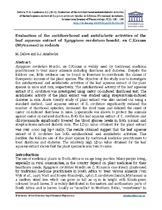| dc.contributor.author | Deliwe, M. | |
| dc.contributor.author | Amabeoku, G.J. | |
| dc.date.accessioned | 2018-01-29T11:52:44Z | |
| dc.date.available | 2018-01-29T11:52:44Z | |
| dc.date.issued | 2013 | |
| dc.identifier.citation | Deliwe, M. & Amabeoku, G.J. (2013). Evaluation of the antidiarrhoeal and antidiabetic activities of the leaf aqueous extract of Syzygium cordatum hoscht. ex C.Krauss (Mytraceae) in rodents. International Journal of Pharmacology, 9(2): 125 – 133 | en_US |
| dc.identifier.issn | 1811-7775 | |
| dc.identifier.uri | http://dx.doi.org/10.3923/ijp.2013.125.133 | |
| dc.identifier.uri | http://hdl.handle.net/10566/3431 | |
| dc.description.abstract | Syzygium cordatum Hoscht. ex C.Krauss is widely used by traditional medicine practitioners to treat many ailments including diarrhoea and diabetes. Despite the folklore use, little evidence can be found in literature to corroborate the claims of therapeutic success of the plant species. The objective of the study was to investigate the antidiarrhoeal and antidiabetic activities of the leaf aqueous extract of the plant species in mice and rats, respectively. The antidiarrhoeal activity of the leaf aqueous extract of S. cordatum was investigated using castor oil-induced diarrhoeal test. The antidiabetic activity of the plant extract was studied using streptozotoxin-induced diabetes in rats. Acute toxicity study of plant extract was also carried out using a standard method. Leaf aqueous extract of S. cordatum significantly reduced the number of diarrhoeal episodes, decreased the stool mass and delayed the onset of castor oil-induced diarrhoea in mice. Loperamide was shown to protect the animals against castor oil-induced diarrhoea. Both the leaf aqueous extract of S. cordatum and chlorpropamide significantly lowered the blood glucose levels in both normal and streptozotoxin-induced diabetic rats. The LD50 value obtained for the plant extract was over 4000 mg kg-1 orally. The results obtained suggest that the leaf aqueous extract of S. cordatum has both antidiarrhoeal and antidiabetic activities. This justifies the folklore use of the plant species by traditional medicine practitioners to treat diarrhoea and diabetes. The relatively high LD50 value obtained for the leaf aqueous extract shows that the plant species is non toxic to mice. | en_US |
| dc.language.iso | en | en_US |
| dc.publisher | Asian Network for Scientific Information | en_US |
| dc.rights | This is the author-version of the article published online at: http://dx.doi.org/10.3923/ijp.2013.125.133 | |
| dc.subject | Syzygium cordatum | en_US |
| dc.subject | Mytraceae | en_US |
| dc.subject | Antidiarrhoeal and antidiabetic activities | en_US |
| dc.subject | Leaf aqueous extract | en_US |
| dc.subject | Mice | en_US |
| dc.subject | Rats | en_US |
| dc.title | Evaluation of the antidiarrhoeal and antidiabetic activities of the leaf aqueous extract of Syzygium cordatum hoscht. ex C.Krauss (Mytraceae) in rodents | en_US |
| dc.type | Article | en_US |
| dc.privacy.showsubmitter | FALSE | |
| dc.status.ispeerreviewed | TRUE | |
| dc.description.accreditation | Web of Science | |

